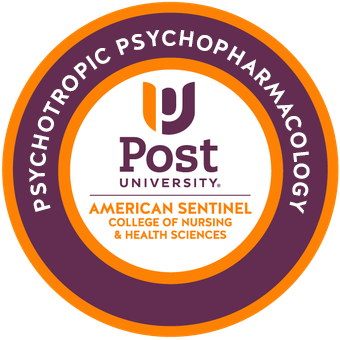View Badge
Melissa Kennedy
Psychotropic Psychopharmacology

Issued by American Sentinel College of Nursing and Health Sciences
to Melissa Kennedy
Earned on
Badge Description
This course will provide the Psychiatric-Mental Health Nurse Practitioner (PMHNP) graduate student with foundational knowledge specific to psychopharmacology and current, evidence-based prescribing practices in mental health for populations across the lifespan. Utilizing principles of pharmacodynamics and pharmacokinetics, modules will provide recommendations for prescribing the best psychotropic medication for presenting symptom sequelae unique to DSM-V diagnoses.
Psychopharmacology
Mental Health
Evidence-Based Practice
Pharmacodynamics
Pharmacokinetics
DSM-V Diagnoses
Psychotropic Medications
Standards of Practice
Healthcare Legal Issues
Ethical Nursing Practice
Federal Regulations
What Was Required to Earn This Badge
Psychotropic Psychopharmacology
Aligned Internal Outcomes
-
Internal
Nursing
https://post.edu/academics/american-sentinel-college-of-nursing/programs/Psychotropic Psychopharmacology
Upon completion of this course, students will be able to:
1. Differentiate unique properties of psychotropics specific to medication class, formulating treatment rationales for targeting specific neurotransmitters
2. Demonstrate an understanding of current recommendations for prescriptive practices per federal standards, regulations and the PMHNP scope of practice
3. Identify nonpsychiatric etiology of primary symptoms targeted in clinical practice, differentiating primary medical comorbidities and/or side effects of medications from primary psychopathological etiology
4. Demonstrate an understanding of ethical and legal implications of prescribing psychotropic medications for populations across the lifespan
5. Apply knowledge of neuroscience and pathophysiology in choosing the most appropriate medication(s) for target psychiatric symptoms
6. Employ an understanding of pharmacodynamics and pharmacokinetics in prescribing psychotropic medications, within the context of population-specific factors, including age, gender, race and ethnicity, cultural variability, gender identity, sexual orientation and medical comorbidities
7.Identify potential adverse outcomes and precipitating factors in psychiatric emergencies, outlining safe prescriptive solutions utilized in crisis management
Aligned External Outcomes
-
https://www.aacnnursing.org/Portals/42/Publications/MastersEssentials11.pdf
AACN The Essentials of Master’s Education in Nursing
Defines quality nursing education.
This course aligns with the following AACN MSN Essentials:
• AACN MSN Essential I: Background for Practice from Sciences and Humanities
• AACN MSN Essential III: Quality Improvement and Safety
• AACN MSN Essential IV: Translating and Integrating Scholarship into Practice
• AACN MSN Essential VI: Health Policy and Advocacy for Patients and Populations
• AACN MSN Essential VIII: Clinical Prevention and Population Health for Improving Health
• AACN MSN Essential IX: Master’s-Level Nursing Practice
For more information, view www.aacnnursing.org and select AACN Essentials, The Essential of Master’s Education in Nursing to review detailed information on the Essentials. -
https://qsen.org/competencies/graduate-ksas/
QSEN Competencies
Aligned QSEN competencies for this course include:
• Patient-Centered Care
• Teamwork & Collaboration
• Evidence-Based Practice
• Quality Improvement
• Safety
• Informatics
For more information view www.qsen.org and select Competencies to review detailed information. -
https://post.edu/academics/american-sentinel-college-of-nursing/programs/
University Principles and MSN Program Learning Outcomes Aligned with this Course
• Accountability:
Analyze models that expand the role of nurses in a global society.
Use theoretical knowledge to guide graduate nursing practice.
• Citizenship:
Evaluate legislation, policies, and economics as applied to the current healthcare environment.
• Leadership:
Integrate roles as leaders and collaborators in various healthcare settings.
• Scholarship:
Appraise research to enhance professional nursing practice.
